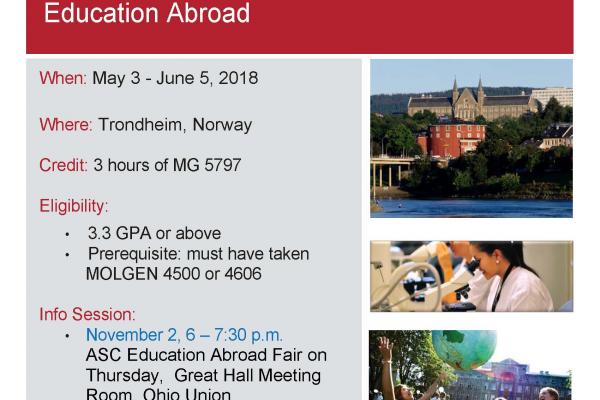Trondbuss Molecular Genetics - Education Abroad

Education Abroad: MoleGen 5797 "Introduction to Biomedical Laboratory Sciences" (3 credit hours)
Description: This class is part of TRONDBUSS (for TRONDheim-ColumBUS and BUSS for bus in Norwegian), a bilateral US-Norway international education initiative between the Molecular Genetics department at OSU, and NTNU (Norwegian University of Science and Technology, Trondheim, Norway). Thisprogram (May 3-June 5, 2018) provides a unique opportunity at the Norwegian University of Science and Technology (NTNU) is focused on practical training in analytical techniques and instrumentation relevant to medical laboratory technology. In addition the students participating in the class will examine the practical and ethical challenges associated with the use of whole genome sequencing in a clinical setting in partnership with St. Olavs hospital, which has pioneered the use of this technology in clinical diagnosis.
Eligibility: Students who have taken the prerequisite MolGen 4500 (or 4606), with a minimal GPA of 3.3, are eligible and need to apply in order to enroll in the class. Students who are planning to take MolGen4500 (or 4606) in Spring 2018 are eligible to apply. Acceptance is conditional upon fulfilling the prerequisite and maintaining a minimal GPA of 3.3. This program is receiving financial support for student participation via a combination of funds from Arts and Sciences and the Norwegian Centre for International Cooperation in Education (SIU). Students who want to enroll in the class MUST apply before January 3rd, 2018 (go.osu.edu/MolecularGenetics). The number of participants is limited to 10 maximum.
General Structure of Course: The course is organized in 3 different laboratory-based modules running in parallel. Module A is concerned with the basic techniques of analysis in a medical laboratory environment. Students will be instructed about general laboratory safety procedures and best practices to handle human biological samples. Students will also learn the principles of manually and automatically operated instruments used for analysis such as for example photometer, fluorimeter, reflectometer and cells counter and run routine analyses using the instruments. Module B is centered on the validation of method of analysis. The goal in this module is for students to learn how to evaluate the accuracy and sensitivity of the different methods of quantification using the various analytical instruments and interpretation of data. Finally, Module C will explore the use of genome sequencing in clinical diagnosis via a tutorial taught by St. Olav’s’ hospital staff at the NTNU genome core facility. Students will learn about the principles and practical aspects of whole genome sequencing and also be exposed to the ethical challenges arising from the use of this novel technology for patients and pre-symptomatic individuals.
Contact information:
Instructor: Dr. P. Hamel (hamel.16@osu.edu)
Program coordinator: Charlie Gbur (gbur.9@osu.edu)
